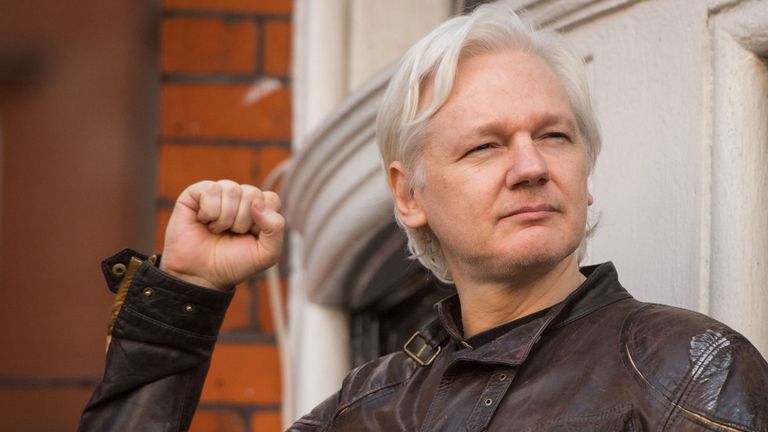

London’s Metropolitan Police confirmed on Thursday that they had arrested WikiLeaks founder Julian Assange at the Ecuadorian Embassy in the British capital. The arrest came after Ecuador dropped Assange’s asylum status, effectively evicting him from their embassy.
Assange hadn’t left the embassy since August 2012, fearing that if he stepped off Ecuador’s diplomatic soil he would be arrested and extradited to the U.S. for publishing thousands of classified military and diplomatic cables through WikiLeaks.
The police said Assange was detained “on a warrant issued by Westminster Magistrates’ Court on 29 June 2012, for failing to surrender to the court” and taken to a central London police station “where he will remain, before being presented before Westminster Magistrates’ Court as soon as is possible.”
Video captured by Russian news agency Ruptly showed police removing Assange, 47, from the embassy on Thursday in handcuffs. His hair appeared to have grown significantly longer and whiter since his last appearance, and he had a long grey beard.
The police said they were “invited into the embassy by the Ambassador, following the Ecuadorian government’s withdrawal of asylum.” Ecuador’s government said it had dropped it’s protection of Assange, “for repeatedly violating international conventions and protocol of coexistence.”
Assange was granted asylum by Ecuador in 2012 as he faced allegations of sex crimes in Sweden that he said were a guise to extradite him to the U.S. That case has been dropped, but he was still subject to arrest for dodging the warrant in the first place.
Arrest draws backlash
While Assange’s leaking of classified U.S. diplomatic and security information has infuriated the U.S. government, his arrest has drawn loud cries from press freedom advocates who argue he provided the materials to journalists in the public’s interest.
Edward Snowden, the U.S. intelligence contractor who leaked thousands of secret documents from the National Security Agency revealing the extent of the U.S. government’s covert data gathering around the world, sent a tweet on Thursday noting that the United Nations has repeatedly called on the U.K. government to let Assange walk free, deeming his hiding in the Ecuadorian embassy an “arbitrary detention.”
Images of Ecuador’s ambassador inviting the UK’s secret police into the embassy to drag a publisher of–like it or not–award-winning journalism out of the building are going to end up in the history books. Assange’s critics may cheer, but this is a dark moment for press freedom. https://t.co/ys1AIdh2FP— Edward Snowden (@Snowden) 11 April 2019
Snowden said Assange’s arrest marked ” a dark moment for press freedom.”
The Secretary-General of Reporters Without Borders, Christophe Deloir, said Thursday that, “Targeting Assange because of Wikileaks’ provision of information to journalists that was in the public interest would be a punitive measure and would set a dangerous precedent for journalists or their sources that the US may wish to pursue in future.”
WikiLeaks, the website that says its function is to “open governments,” and entities linked to the Kremlin have a relationship that goes back further than the 2016 election.
more recommended stories
 Navigating Through Turbulence: The Role of Somalia’s Foreign Ministry in Shaping Future Relations with Somaliland.
Navigating Through Turbulence: The Role of Somalia’s Foreign Ministry in Shaping Future Relations with Somaliland.By: Abdi Jama In the nuanced.
 A Vision for Change: Dr. Abdirahman Irro’s Blueprint for Somaliland’s Future
A Vision for Change: Dr. Abdirahman Irro’s Blueprint for Somaliland’s FutureDr. Abdirahman Mohamed Abdillahi Irro, a.
 Past, Present, and Future of Somaliland: A Nation at the Crossroads
Past, Present, and Future of Somaliland: A Nation at the CrossroadsThe story of Somaliland is marked.
 The High Cost of Non-Visionary Leadership: Analyzing Somaliland under President Colonel Muse Bihi
The High Cost of Non-Visionary Leadership: Analyzing Somaliland under President Colonel Muse BihiBy: Abdi Jama In the intricate.


Leave a Comment